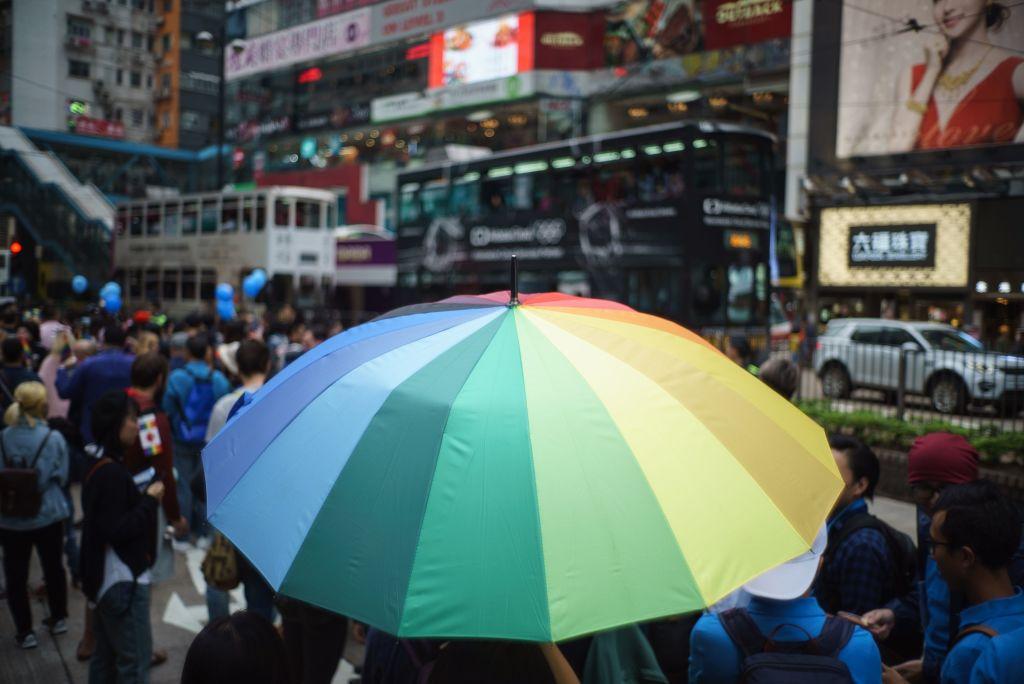
While the Covid-19 pandemic has shifted attention away from Hong Kong’s fight for democratic freedoms, protests have made the city a focus of the Chinese government’s authority and stance on human rights. Recent events have proved that the democratic question remains a live issue.
A cornerstone of the political struggle is freedom of expression, and the ongoing fight for LGBTQ+ rights is an important test of that freedom. Where LGBTQ+ rights are suppressed, political, economic and social rights will be too. The status of LGBTQ+ communities and their political future in Hong Kong is a major battleground in Hong Kong’s political landscape and a guide to the status of other minorities and political dissidents. The rise of Chinese state control as it continues to implement the Hong Kong national security law will likely challenge the progress made in recent years.
While living in Hong Kong, I saw the work of local organisations like the Pink Alliance and Hong Kong Marriage Equality. Such work is a key part of the push for better human rights legislation and challenges the government’s ability to restrict individual expression.
Despite the pandemic and the violence directed at protesters, there’s been considerable progress.
The monthly networking event run by the Pink Alliance, ‘Fruits in Suits’, was established in 2004 and became one of the longest running LGBTQ+ professional networks. It provided an invaluable space for members of the community to meet, learn and develop professionally. Social distancing measures associated with the Covid-19 pandemic led to its cancellation, along with the annual Pink Season festival, which fosters community and builds wider awareness for the rest of the city. In addition, vital queer spaces such as communal safe spaces and gay-friendly bars have been closed, cutting off a supportive lifeline for many members of the LGBTQ+ community.
This development affects more than just the mental health and wellbeing of individuals. It also affects the momentum of the LGBTQ+ equality movement, further splintering and isolating the community at a time when human rights in Hong Kong are increasingly vulnerable.
In response, organisations like the Pink Alliance have had to adapt quickly to keep up the momentum in advocating for human rights and equality. They have pivoted to the virtual world and are offering events and activities online.
Notably, they’ve launched the Equal Love initiative with four other community organisations this year. To date, more than 70 companies have pledged their support for marriage equality.
During the pandemic and the political instability in Hong Kong, these organisations have continued to push for marriage equality and individual rights. Their goals are closely aligned with the fight for democracy. The symbiotic relationship between these organisations and the political movement for democracy is clear.
The successes of LGBTQ+ activism can be seen in the legal sphere where, despite increasing pressure from Beijing, significant progress has been made. A key example is the recent series of court victories which have begun to chip away at Hong Kong’s homophobic marriage law.
The QT Case in 2018 saw a British national win the right to live and work in Hong Kong with her wife. The court of final appeal held in favour of the plaintiff, finding that it was discriminatory not to grant work visas for a civil union. High-profile support for the couple came from 15 law firms and 16 banks, including Goldman Sachs and Morgan Stanley.
In the Angus Leung Case in 2019, a civil servant who worked in the Department of Immigration won spousal benefits for his husband, whom he married in New Zealand. The legal victory overturned the government’s decision to withhold employee welfare support and allowed same-sex couples to file tax returns jointly.
A number of cases, including one heard in the high court, have confirmed the right for same-sex couples to apply for public housing.
These victories have helped to chip away at the legal distinction between opposite-sex and same-sex marriages. While same-sex marriages are still not explicitly approved, momentum has built in recent years. A number of important cases are now in the courts and could lead to some victories in the rights to divorce, adoption and gender expression.
Activists are also focused on expanding the definition of discrimination to include protection for sexual orientation and gender identity, in addition to race, gender, disability and marital status. However, given the conservative nature of Hong Kong’s current leadership, the executive branch is unlikely to lessen discrimination. The rise of Beijing’s influence will likely see the executive branch slow, or even reverse, progress in this sphere. Future progress will depend on changes in executive leadership.
Perhaps the biggest indicator of change on the horizon is Hong Kong’s successful bid to host the Gay Games in 2022. If this event goes ahead, it will be the highest profile LGBTQ+ gathering ever in the city.
Across the landscape of politics, law and civil society in Hong Kong, huge shifts are taking place. In a city already facing a turbulent political future, 2020 may prove to have been a tipping point between the advancement or regression of human rights. LGBTQ+ activism has long been at the centre of the fight for individual freedoms. The work of these advocates will shape rights in Hong Kong for years to come.